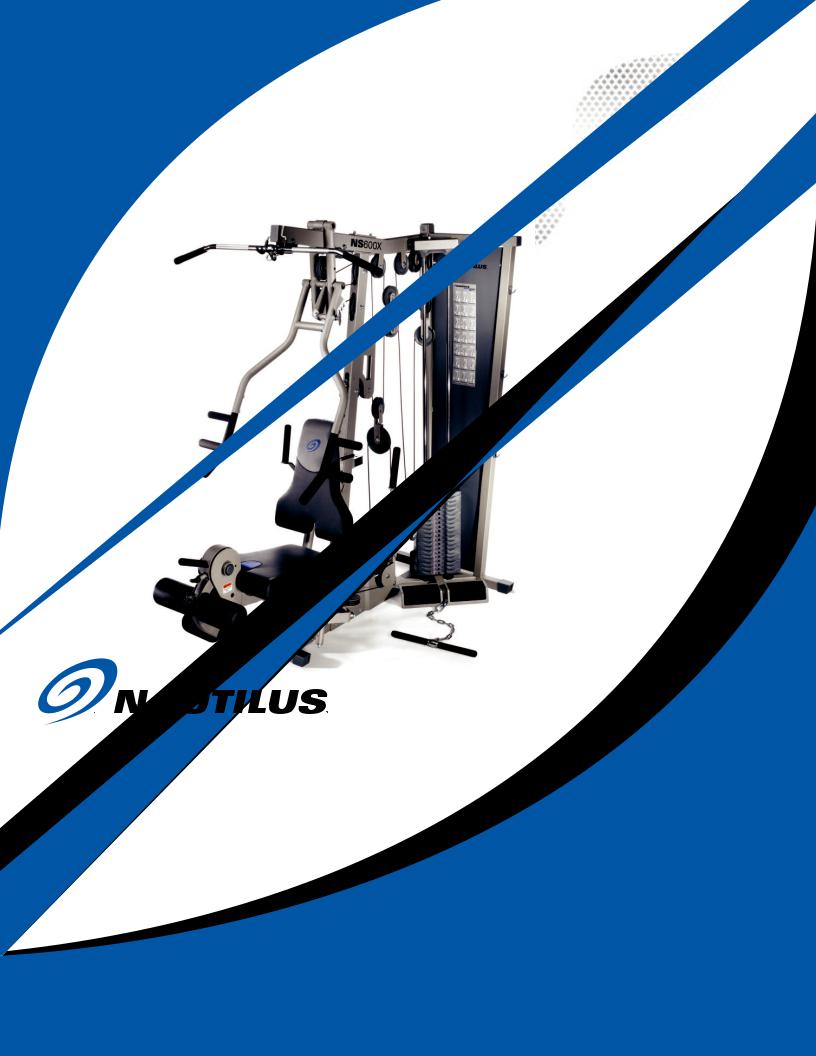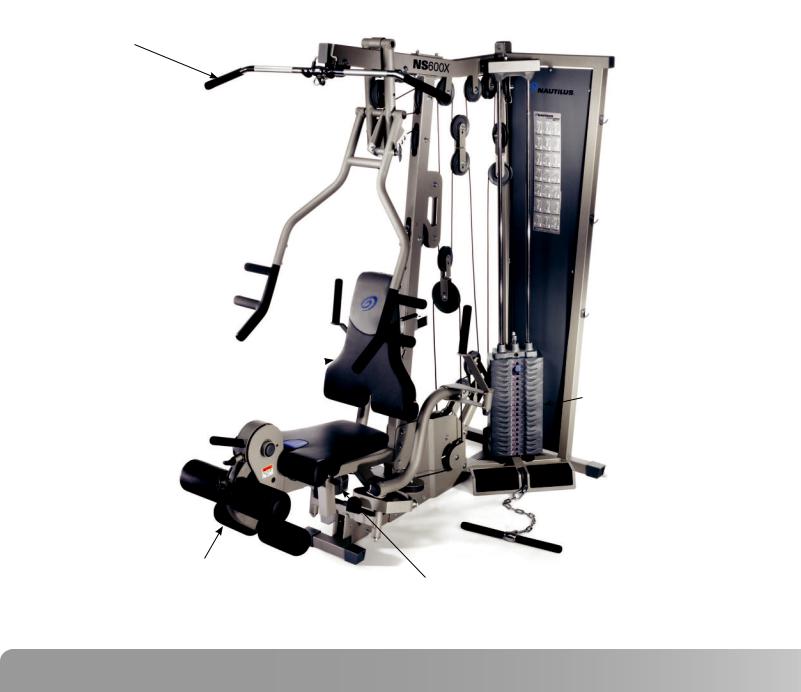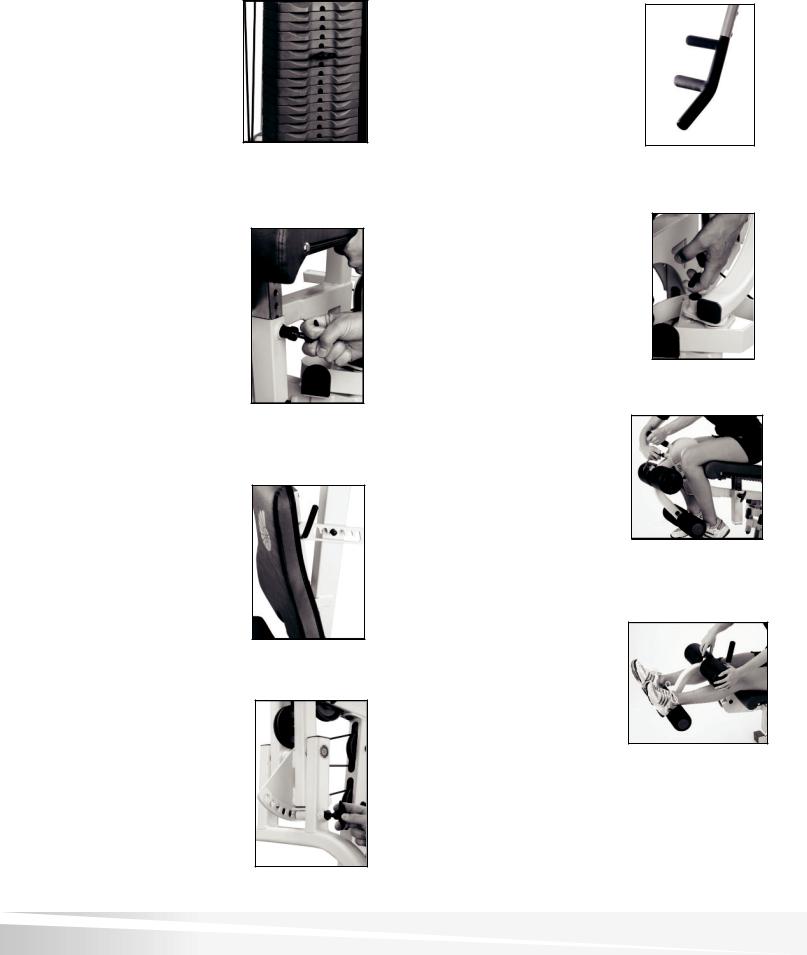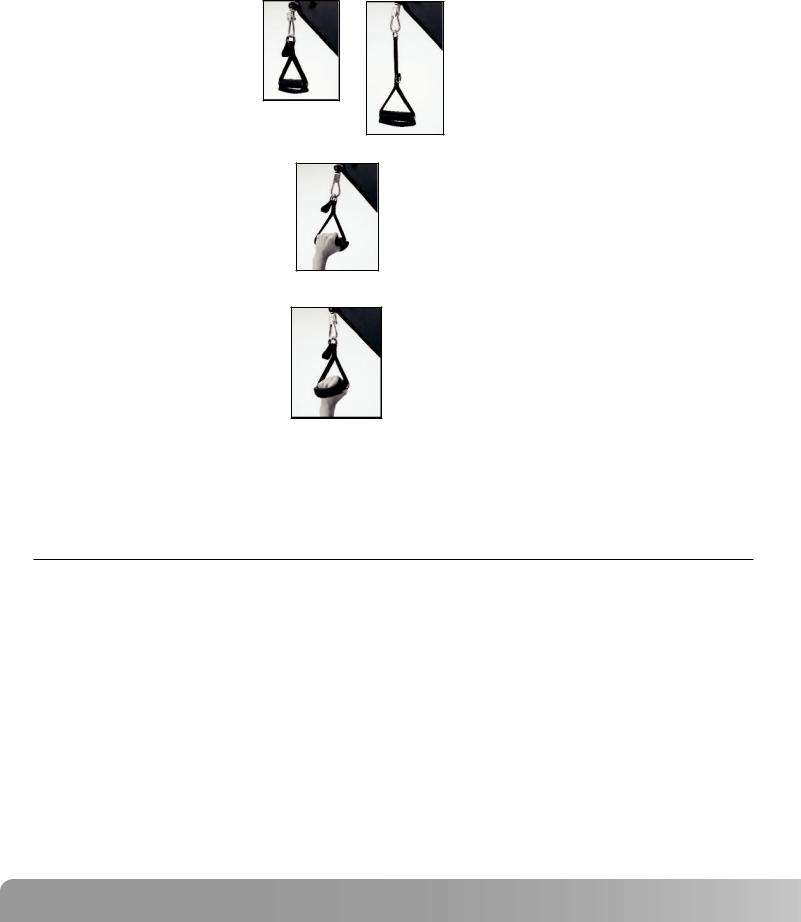Nautilus NS 600X User Manual

NS 600X
Owners Manual & Fitness Guide
Model: NS 600X
P/N: 001-6998 Rev A (09/22/2006)

TABLE OF CONTENTS
Safety Information......................... |
3 |
Getting To Know Your Machine... |
4 |
Using Your Machine...................... |
5 |
Maintenance................................... |
6 |
Defining Your Goals....................... |
7 |
The Workouts |
|
The 20 Minute Better Body Workout............. |
9 |
Complete Conditioning............................. |
10 |
Strength Training.................................... |
11 |
Chest Exercises |
|
Chest Press.......................................... |
12 |
Incline Chest Press................................. |
12 |
Pec Dec............................................... |
13 |
Shoulder Exercises |
|
Seated Shoulder Press............................. |
13 |
Front Shoulder Raise............................... |
14 |
Rear Deltiod Rows.................................. |
14 |
Back Exercises |
|
Wide Pulldowns..................................... |
15 |
Reverse Grip Pulldowns............................ |
15 |
Seated Lat Rows.................................... |
16 |
Seated Low Row.................................... |
16 |
Low Back Extensions............................... |
17 |
Arm Exercises |
|
Seated Triceps Extension.......................... |
17 |
Triceps Kickback.................................... |
18 |
Triceps Pushdown.................................. |
18 |
Standing Biceps Curl............................... |
19 |
Leg Exercises |
|
Leg Extension........................................ |
19 |
Leg Curl............................................... |
20 |
Standing Hip Extension............................. |
20 |
Standing Calf Raise................................. |
21 |
Standing Hip Abduction............................ |
21 |
Standing Hip Adduction............................ |
22 |
Abdominal Exercises |
|
Seated Abdominal Crunch......................... |
22 |
Warranty Information.................... |
23 |
Important Contact Numbers......... |
24 |

Safety Information
Important Safety Information: SAVE THESE INSTRUCTIONS
The following definition applies to the word “Warning” found throughout this guide:
7!2.).' |
Indicates a potentially hazardous situation which, if not avoided, could result in |
|
death or serious injury. |
||
|
prior to Using this Equipment, observe the following warnings
1.Read and understand the complete Owners Manual.
2.Read and understand all Warnings on this machine. See the Safety Warning Labels of this manual.
3.Keep children away from this machine and / or supervise them closely if they are near the machine or present during its operation. This machine is not suitable as a children’s toy. There is a natural tendency for children to want to play on exercise equipment and parents and other in charge of children should be aware of their respective responsibilities. Moving parts that may appear to present obvious hazards to adults may not appear to do so to children.
4.Consult a physician prior to commencing an exercise program. If, at any time, you feel faint or dizzy, or experience pain, stop and consult your physician.
5.Inspect this machine for loose parts or signs of wear. Pay special attention to the Seat. Do not use if found in this condition; contact Nautilus Customer Service.
6.This machine is for Consumer use only
7.This machine is designed for a User’s Weight Limit of 300 pounds /136.078 kilograms. Do not use if you are over this weight.
8.This machine contains moving parts. Use Caution. Do not wear loose clothing or jewelry.
9.Set up and operate selectorized strength equipment on a solid level surface.
10.Do not pin the Weight Stack into an elevated position.
11.Be sure that the Weight Pin is properly inserted when using this machine.
12.Do not use Weight Plates or dumbbells or other external means to increase the resistance of this machine.
13.Set up the machine so that there is a free area around the
machine of 3ft./ .9 meters. Keep third parties out of this area when the machine is in use.
14.Operate the machine in the manner described in this manual. It can be hazardous to over-exert yourself during exercise.
15.Make sure that all positional adjustment devices are securely engaged.
Nautilus NS600X

Getting to KNow Your Machine
When you buy any exercise equipment, you need stability. You want durability. But these two qualities alone are not enough. You need equipment that’s designed by people who understand the importance of anatomical correctness during exercise.
At Nautilus, our expertise in the science of human performance goes into every piece of equipment we offer. We design our machines to be stable, comfortable and to provide the body support you need to exercise with proper form, while avoiding injury.
As a supplier of fitness equipment to health clubs worldwide, the Nautilus name has become synonymous with
•Ultimate performance
•Optimum results, and
•Maximum durability.
As you pursue your fitness goals, you trust that the same care and craftsmanship goes into our full line of home gym equipment, too.
Nautilus®... Making the world stronger since 1970.
Lat Pulldown Bar
Press Arm Adjustment 
Multi Handle Grip 
Adjustable Seat Back 
Primary Weight Stack
Leg Extension
Seat Height Adjustment

USING YOUR MACHINE
Weight Selection and Adjustment
To adjust weight, make certain weight stack is not in use or lifted. Simply pull the weight pin from the weight stack and select the desired weight. Insert pin completely and make certain it is locked into place before lifting. In
general, always start with lower weights and work up to find the weight most appropriate for your goals and capacity.
Lower Seat Adjustment
To adjust the lower seat, pull the seat pin from the side of the machine. Facing the machine, the adjustment is on the right side, under the seat. This adjustment cannot be done while you are sitting on the seat, so you’ll want to position yourself back on the seat after the adjustment to ensure proper seat alignment. Proper seat alignment ensures exercise
efficiency and comfort, while reducing the risk of injury.
Seat Back Adjustment
Proper arm length extension for seated rows, chest presses, rear delts, etc. Completed through
using the commercial-grade ratchet adjustment. Simply pull the seat back forward until it rests in the correct position.
Press Arm Adjustment
This pop pin adjustment allows proper positioning of all chest exercises, seated rows, and moves the arms out of the way for storage. Simply pop the pin out and move it until you reach a comfortable arm position. As a general rule, never start chest exercises behind your shoulders.
Dual Grip Handles
The Nautilus NS600X offers a variety of grip placements for user comfort and muscle isolation. Be sure to use the proper grip for each of your
exercises.
Pec Dec Arm Adjustment
Pop pin adjustment allows proper arm positioning on Pec Dec exercises. Also allows arms to move out of the way for storage. Simply pull pin up and place in proper position.
Leg Extension Adjustment
To set your NS600X up to perform a leg extension exercise, place your ankles behind the lower rollers, grasp the adjustment handle with one hand while pulling the adjustment pin with the other. Lower the arm into the leg extension position and release pin to engage.
Leg Curl
To perform a leg curl exercise, place your ankles on the top of the lower rollers and adjust arm into the upper position. Then adjust leg curl hold down rollers by pulling adjustment pin and rotating the upper rollers until rollers are tightly secured to upper shin.
Nautilus NS600X

USING YOUR MACHINE
Using Cable Station Hand Grips:
These handgrips can
be used as regular grips, hand cuffs orankle cuffs and can be placed over the shoulders for aid in
resisted crunch and oblique exercises.
Regular Grip:
Grasp the handle and cuff together to form a grip without inserting your hand through the cuff portion. Most of the exercises you perform utilize this grip.
Hand Cuff Grip:
Slip your hand through the cuff portion of the grip so that the foam pad rests on the back of your hand. Then grasp the
remainder of the grip that is sitting in your palm. This method of gripping is great for exercises like front shoulder raises or any exercise where your palm is facing down.
Grips manufactured under license agreement with
Hands-On Sports & Gym Accessories Inc. Patent # 4756527
MAINTENANCE
Daily– Before each use you should inspect your weight machine to ensure that the cables and pulleys are in good condition and operating smoothly. If cable appears to have any damage, including bulging, discoloration or any wires are exposed, DO NOT USE MACHINE. Contact your authorized Nautilus Fitness Dealer to service machine. After each use, wipe machine free of sweat with a clean, dry cloth. Upholstery can be cleaned with a mild detergent or spray cleaner. DO NOT clean the upholstry with cleansers that contain enzymes.
Weekly – If used often, your machine should be thoroughly cleaned using a clean cloth and an ammonia-based cleaner. Wipe machine down completely and be sure to touch up any scratches with touch-up paint to prevent rusting.
Twice Yearly– To keep your machine operating smoothly and looking good for many years to come, you want to clean and lubricate the machine’s Guide Rods. To do this, remove the weight shrouds using a 9/16” socket or wrench. Clean the long chrome rods thoroughly using a clean cloth and ammonia cleaner. Wipe rods completely dry. Spray a generous amount of silicon
lubricant on the rods.

DEFINING YOUR GOALS
Your body will do what you train it to do. That’s why it’s important to define your goals and focus on those goals. Here are some fitness components that will help you define your goals and choose your fitness program.
MUSCLE STRENGTH is the maximum force you can exert against resistance at one time. Your muscle strength comes into play when you pick up a heavy bag of groceries or lift a small child. It is developed when a localized muscle is worked both positively (concentric) and negatively
(eccentric) at a resistance great enough to perform only five to eight repetitions of the exercise before the muscle fails. Each set of repetitions is followed by a rest interval that typically runs three times longer than the set. Later, between exercise sessions, the muscle overcompensates for the stress and usually increases in both strength and size.
MUSCLE ENDURANCE is the ability to perform repeated contractions. It comes into play when you cross-country ski or work on your feet all day. Endurance training addresses the slow twitch, endurance muscle fibers, which depend on oxygen for energy. To develop muscle endurance, use low resistance and high repetitions — about 1520 repetitions in each set, three sets to each exercise, working the muscle only to fatigue.
MUSCLE POWER is the combination of strength and speed of the muscular contraction. This is often misinterpreted as:
a)Being directly associated with certain skill or sport and/or
b)Meaning that you must move fast.
Load is actually a more important factor than speed when attempting to improve power.
When training to achieve muscular power, pick a resistance that fatigues you in the 3-5 repetition range. When performing these reps, it is more important to think of contracting the muscles faster rather than attempting to move faster. Performing sport simulation exercises usually results in a deterioration of the motor pattern or skill. The biomechanically sound method of improving power in your sport is to train for power using the correct joint movements, as described in this manual. Then practice the skill associated with your sport, learning to apply this newly achieved power.
BODY COMPOSITION is the ratio of fat weight (fat) to lean weight (muscles, bones and tissue). As you age, the ratio shifts. The fat weight increases and the lean weight decreases. Training for muscle strength will generally increase muscle size and aerobic conditioning will help burn extra calories. Performing these two forms of exercise, either at different times or together, will create the greatest changes in body fat weight.
BALANCED STRENGTH and alignment is the result of equal strength developed in all parts of the body. It comes into play in your standing and sitting posture, and in your ability to perform just about any activity safely and effectively. An over-development of the back will round the shoulders; weak or stretched abdominals can cause lower back pain. You want a balance of muscle strength in front and back. In addition, you need a balance of strength between your middle, lower, and upper body.
FLEXIBILITY is the ability of a muscle or group of muscles to move the joint through a full range of motion. Flexibility comes into play when you execute an overhand serve or stretch for the top shelf in the kitchen. It is a cooperative movement of opposite muscle groups. When a muscle contracts, its opposite muscle group must relax for the action to occur. Increased flexibility means an increased range of motion, made possible by this simultaneous contracting and relaxing. Good flexibility is important in protecting the body from injury and can be achieved through the balanced strength training programs included in this manual.
CARDIOVASCULAR ENDURANCE is the ability of the heart and lungs to supply oxygen and nutrients to exercising muscles over an extended period of time. It comes into play when you jog a mile or ride a bike. It is a critical component of overall fitness and health. Any exercise program must be supplemented with cardiovascular training.
Nautilus NS600X

DEFINING YOUR GOALS
Reaching Your Goals
To reach your goals you must follow a consistent, well designed program that provides balanced development to all parts of the body and includes both aerobic and strength exercise. Only then will you meet your goals safely and efficiently.
The workout routines found in this manual are professionally designed and written to target specific fitness goals. Should you not find one specific program to your liking, you can design your own, based on sound information and the principles found in this manual.
Designing Your Own Program
You may want to design your own personal program specifically geared to your goals and lifestyle. Designing a program is easy, as long as you follow these guidelines.
Understand fitness and its components:
Improperly designed programs can be dangerous. Take some time to review this manual as well as other fitness guides.
Know your current fitness level: Before you start any fitness program you should consult a physician who will help you determine your current abilities.
Identify your goals: Goals are critical to choosing and designing an exercise program that fits and enhances your lifestyle, but so is strategy. It’s important not to rush the process and try to accomplish too much too soon. That will lead to setbacks and discouragement. Instead, set a series of smaller achievable goals.
Select complementary exercises: Be sure to pair exercises that address compound joint movements and single joint movements. In addition, select exercises that address complementary muscle groups.
Put first things first: During each session, first work those muscle groups that need the most training.
Remember your cardiovascular component:
Any fitness program must contain a cardiovascular fitness component to be complete. So complement your resistance training with aerobic exercise such as walking, running, or bicycling.
Training variables: When designing your own program there are several variables that, when mixed properly, will equal the right fitness formula for you. In order to find the best formula, you must experiment with several combinations of variables. The variables are as follows:
•Training Frequency: The number of times you train per week. We recommend daily activity but not daily training of the same muscle group.
•Training Intensity: The amount of resistance used during your repetition.
•Training Volume: The number of repetitions and sets performed.
•Rest intervals: The time you rest between sets and the time you rest between workouts.
Once you’ve established a base of fitness, follow these basic principles:
•Isolate muscle groups: Focus work on specific muscle groups.
•Progressive Loading: The gradual systematic increase of repetitions, resistance and exercise period.
